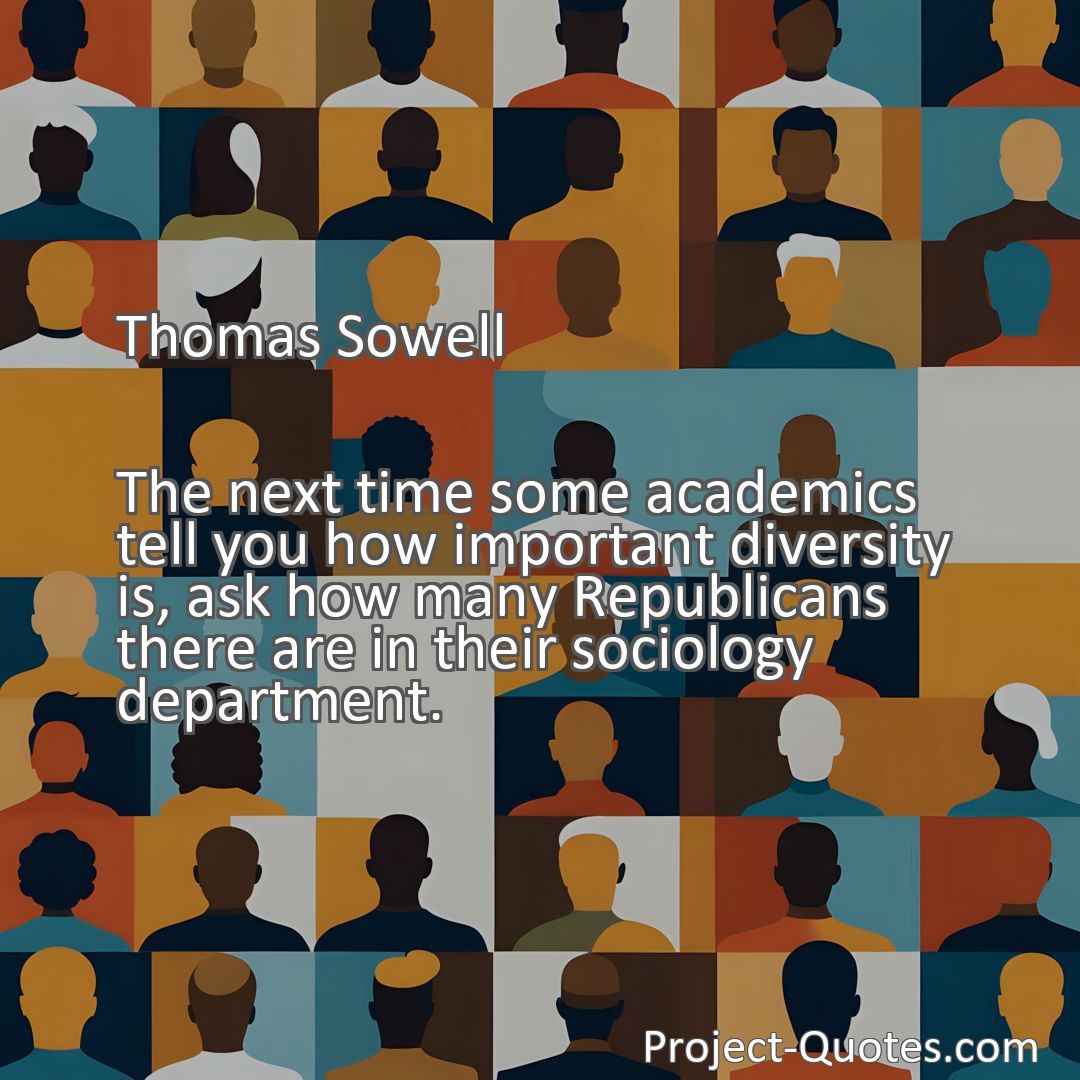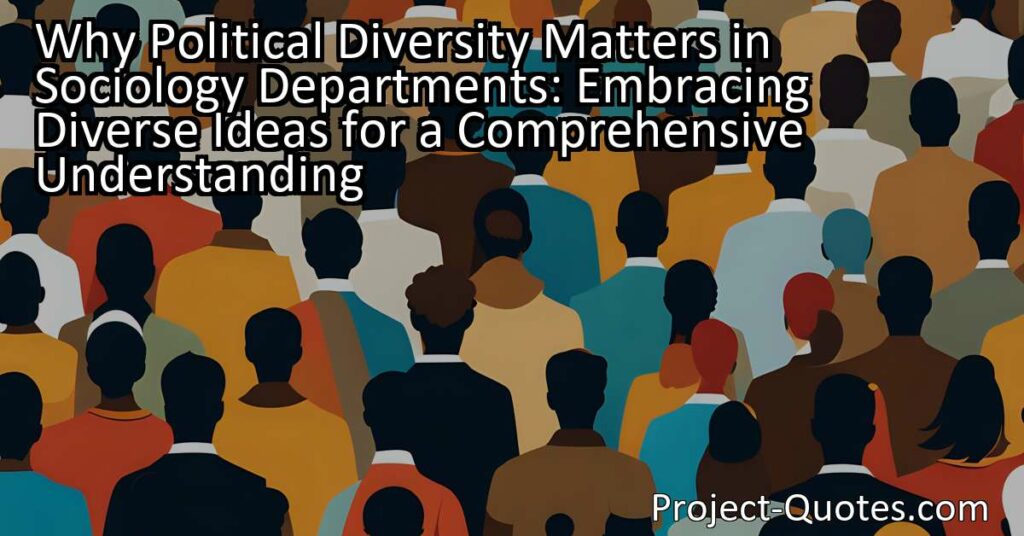The next time some academics tell you how important diversity is, ask how many Republicans there are in their sociology department.
Thomas Sowell
In order to create an inclusive and intellectually stimulating environment, it is crucial for individuals to feel comfortable expressing diverse ideas within sociology departments. By promoting political diversity, these departments can enrich research, encourage critical thinking, reduce biases, and bridge the gap between academia and society. Embracing a range of political ideologies does not threaten principles of openness, inclusivity, or social justice, but rather strengthens the field of sociology and contributes to a deeper understanding of the complex social world we live in.
Table of Contents
- 1 The next time some academics tell you how important diversity is, ask how many Republicans there are in their sociology department.
- 2 Thomas Sowell
- 3 Meaning of Quote – The next time some academics tell you how important diversity is, ask how many Republicans there are in their sociology department.
- 4 Freely Shareable Quote Image
- 5 Related
Meaning of Quote – The next time some academics tell you how important diversity is, ask how many Republicans there are in their sociology department.
Diversity is a term that we often hear in today’s society. It refers to the inclusion of people from various backgrounds, cultures, races, and perspectives. Many individuals advocate for diversity, arguing that it is essential for fostering creativity, innovation, and understanding. However, a quote by Thomas Sowell challenges the idea of diversity within academic circles, particularly focusing on the lack of political diversity among sociology departments.
The quote humorously presents a thought-provoking question: “The next time some academics tell you how important diversity is, ask how many Republicans there are in their sociology department.” It suggests that the very individuals advocating for diversity might be lacking it in their own professional environments. In a friendly tone, let’s delve deeper into this quote and explore the importance of diverse viewpoints within sociology departments.
Sociology, as an academic discipline, studies human behavior, society, and social relationships. It aims to understand and explain various aspects of social life, such as inequality, culture, and social change. Given the broad spectrum of societal phenomena, it becomes crucial to have a diverse range of perspectives within sociology departments to gain a comprehensive understanding of society.
When we talk about diversity, it is essential to acknowledge that it encompasses different aspects. While most discussions revolve around race, ethnicity, and gender diversity, Sowell’s quote highlights the significance of political diversity. Political diversity ensures that individuals with contrasting political ideologies and beliefs contribute to academic discourse, fostering a healthy academic environment that embraces differing viewpoints.
Academic institutions should strive to create an inclusive space where individuals feel comfortable expressing diverse ideas, regardless of their political leanings. It is crucial to promote intellectual diversity that represents a broad range of political opinions, including conservatives, liberals, and everything in between. By encouraging open dialogue and engaging with different political perspectives, sociology departments can enrich their research, teaching, and overall understanding of the social world.
One might argue that political diversity within sociology departments is irrelevant or unnecessary. However, a lack of political diversity can inadvertently lead to an echo chamber effect, where ideas and perspectives are repeatedly reinforced, limiting critical thinking and hindering academic progress. In such an environment, biases can go unchecked, and alternative viewpoints might be disregarded or dismissed without proper consideration. Thus, political diversity not only strengthens academic rigor but also promotes intellectual humility and fosters creativity.
Introducing political diversity within sociology departments has the potential to challenge prevailing assumptions and theories, leading to more robust and well-rounded research. Differing political viewpoints provide opportunities for healthy debates and constructive criticism, encouraging scholars to delve deeper into their research, pose tougher questions, and challenge their own preconceived notions.
Moreover, political diversity promotes a higher level of objectivity in research. When multiple perspectives are represented, it becomes less likely for personal biases to influence the interpretation of data and research findings. In turn, this strengthens the validity and reliability of research conducted within sociology departments, enhancing the overall credibility of the field.
By embracing political diversity, sociology departments can also bridge the gap between academia and the wider society. It is undeniable that political divisions exist in the real world, and sociology, as a field dedicated to understanding society, should reflect these divisions to remain relevant and connected to the communities it studies. Political diversity enables departments to examine social issues from various angles, providing a more accurate and comprehensive understanding of societal trends and challenges.
It is important to note that embracing political diversity does not mean compromising the principles of inclusivity, empathy, or social justice. Rather, it means creating an environment where diverse voices are heard, respected, and engaged with constructively. By fostering open conversations and encouraging intellectual curiosity, sociology departments can transcend political divides and work towards a common goal: understanding and improving society.
In conclusion, Thomas Sowell’s quote challenges us to critically reflect on the importance of political diversity within sociology departments, prompting us to consider whether diversity is truly being embraced in academia. While diversity is frequently advocated for in academic circles, there is often an oversight when it comes to political diversity. By promoting political diversity, sociology departments can foster a more inclusive and intellectually stimulating environment. Different political perspectives can enrich research, encourage critical thinking, reduce biases, and bridge the gap between academia and society. Embracing a range of political ideologies is not a threat to the principles of openness, inclusivity, or social justice, but rather an opportunity to strengthen the field of sociology and contribute to a deeper understanding of the complex social world we live in.
I hope this quote inspired image brings you hope and peace. Share it with someone who needs it today!


